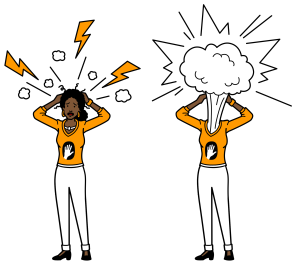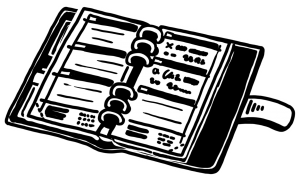Stress release methods for work

Stress is usually experienced when there is a difference between what is required of us, and what we feel we can deliver. Any job can have stressful elements. Short term pressures may involve meeting a deadline, or working with difficult customers. It is, however, the long term chronic stress that can be overwhelming and indeed harmful, both physically and emotionally. Chronic stress does not only take its toll on your well being and productivity, but also on your family life.
Don't feel like reading? Watch our video!
Stress may contribute to problems such as a headache, sleep disturbances, difficulty concentrating and short temper. Each of these phenomena could potentially be the cause of even more stress. For example, due to a lack of concentration you may be unable to complete your work efficiently, or you may miss deadlines… contributing to more stress. Or, a short temper may result in harmed relationships and… even more stress.
Chronic stress has a negative impact on one’s health. It manifests as anxiety, insomnia, high blood pressure, and a weakened immune system. Furthermore, it may be the cause of conditions such as depression, obesity and heart disease. Stress in the workplace ultimately also affects one’s personal life. It may, for example, put strain on relationships, due to emotional instability or health issues.
Chronic stress has a negative impact on one’s health. It manifests as anxiety, insomnia, high blood pressure, and a weakened immune system. Furthermore, it may be the cause of conditions such as depression, obesity and heart disease. Stress in the workplace ultimately also affects one’s personal life. It may, for example, put strain on relationships, due to emotional instability or health issues.
What is causing employees stress?
The main culprit is possibly excessive workload – a pressure to meet deadlines and an expectation to always perform at your best and to always deliver. Frustration with poor management and a lack of support are also big contributors to stress in the workplace. Other contributors include threat of redundancy and unrealistic expectations.
Stress release methods for work
What can you do to cope with stress at work? The first step would be to recognize that you suffer from work-related stress and then to also identify the precise causes of the stress that you experience. Note how you respond to the stress. (E.g. do you typically raise your voice, speak offensively, reach for unhealthy snacks, etc.) Only once you have done this type of assessment can changes be made to 1) reduce stress and 2) respond better to unavoidable stressful situations. Having open lines of communication, planning and prioritizing tasks, engaging in creative activities and emotional writing, and living a healthy lifestyle are great ways to release and monitor stress levels at work.

Open communication
Once you have identified causes of stress at work it may be necessary to talk to your manager and/or colleagues to make them aware of issues that cause difficulties for you. The purpose of this should be clear: you are not complaining, but aim to increase productivity by eliminating or reducing stress. Share your experiences and (if possible) suggest some practical ideas about what might help to alleviate the difficulties. Your colleagues may also have some suggestions as to what could be done to make your tasks less stressful. This will be an incentive to your superiors, as well as to your colleagues, to create a positive work environment with work practices that promote employee well-being. Confiding in your manager and colleagues should help you to find solutions and support.
Plan and prioritize
Effective time management and planning can also help you reduce stress at work. When one feels that things are slipping out of control, stress is most likely to occur! Therefore, plan ahead and prioritize. Make sure that you set realistic deadlines and include breaks for yourself in your schedule. Don’t have unrealistically high expectations of yourself. Recognize that there is only so much time available in a day. Part of that time is for work and part of it is for you and your home. Try to keep work-life and home-life separated. Creating clear boundaries between these realms can significantly reduce conflict and stress.

Creative activities
Engaging in a creative activity such as making a video using simpleshow and practicing emotional writing is a great way to release stress while taking a break at work. Writing a creative or informative story and then using your imagination to choose and set up aesthetically pleasing visuals will take your mind off of any stressful situation at work.
Healthy living
A healthy balanced lifestyle will help you to deal optimally with work-related stress. Good nutrition, enough sleep, sufficient hydration and regular exercise are needed for your mind and body to cope with stressful situations. For example, limiting caffeine in-take late in the day and stimulating activities late at night, like using the PC or watching TV, will help you sleep better.
Relaxation also forms part of a healthy balanced lifestyle! Learn how to relax and how to “switch off”, in order to replenish your energy. Make time for yourself, and do the things that you like doing – it will increase your happiness and contribute to increased levels of energy.
It may also help to remove yourself from a stressful situation. Focus on something else and deal with the stressful issue once you are able to look at it with a realistic and positive outlook. Remember, all does not necessarily have to be dealt with immediately. That does not mean that you procrastinate. Simply wait for the right moment to tackle what may be complex, so that it does not overwhelm you.
Relaxation also forms part of a healthy balanced lifestyle! Learn how to relax and how to “switch off”, in order to replenish your energy. Make time for yourself, and do the things that you like doing – it will increase your happiness and contribute to increased levels of energy.
It may also help to remove yourself from a stressful situation. Focus on something else and deal with the stressful issue once you are able to look at it with a realistic and positive outlook. Remember, all does not necessarily have to be dealt with immediately. That does not mean that you procrastinate. Simply wait for the right moment to tackle what may be complex, so that it does not overwhelm you.
